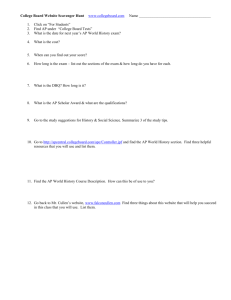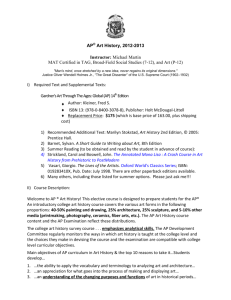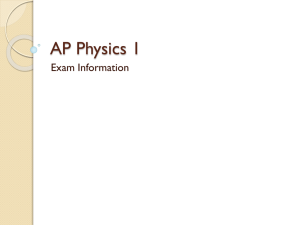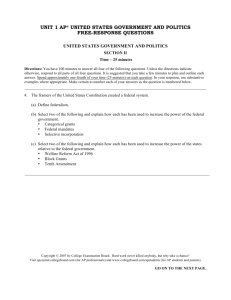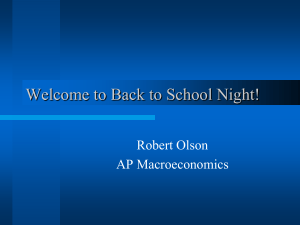AP Course Prerequisitie Knowledge - mmcgirr
advertisement
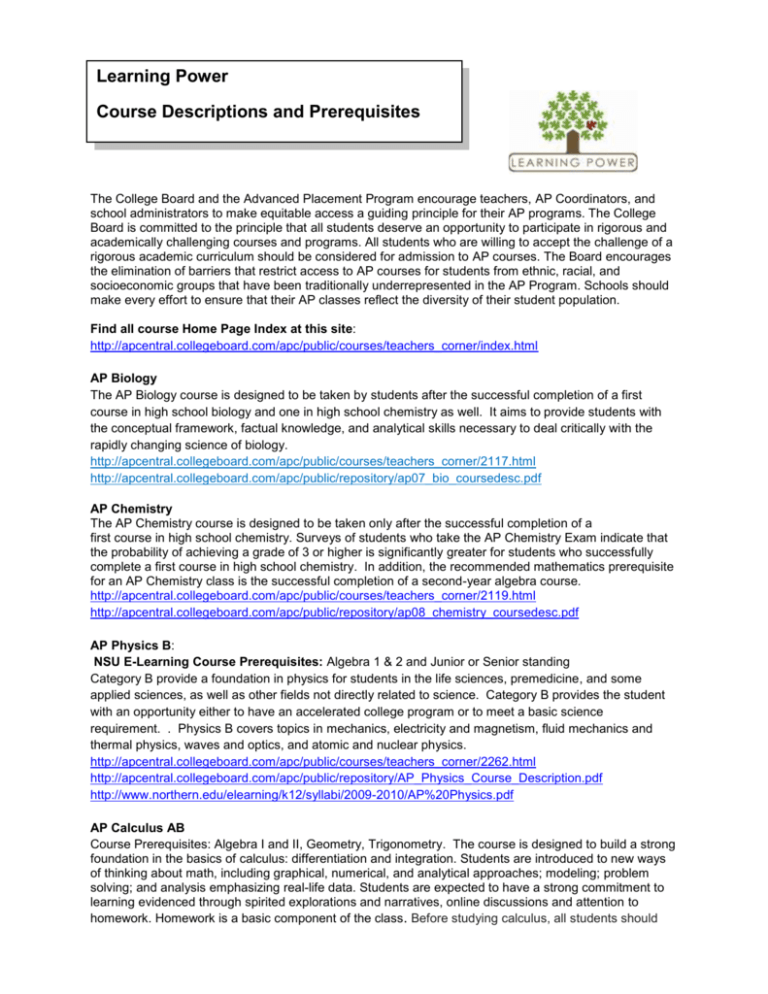
Learning Power Course Descriptions and Prerequisites The College Board and the Advanced Placement Program encourage teachers, AP Coordinators, and school administrators to make equitable access a guiding principle for their AP programs. The College Board is committed to the principle that all students deserve an opportunity to participate in rigorous and academically challenging courses and programs. All students who are willing to accept the challenge of a rigorous academic curriculum should be considered for admission to AP courses. The Board encourages the elimination of barriers that restrict access to AP courses for students from ethnic, racial, and socioeconomic groups that have been traditionally underrepresented in the AP Program. Schools should make every effort to ensure that their AP classes reflect the diversity of their student population. Find all course Home Page Index at this site: http://apcentral.collegeboard.com/apc/public/courses/teachers_corner/index.html AP Biology The AP Biology course is designed to be taken by students after the successful completion of a first course in high school biology and one in high school chemistry as well. It aims to provide students with the conceptual framework, factual knowledge, and analytical skills necessary to deal critically with the rapidly changing science of biology. http://apcentral.collegeboard.com/apc/public/courses/teachers_corner/2117.html http://apcentral.collegeboard.com/apc/public/repository/ap07_bio_coursedesc.pdf AP Chemistry The AP Chemistry course is designed to be taken only after the successful completion of a first course in high school chemistry. Surveys of students who take the AP Chemistry Exam indicate that the probability of achieving a grade of 3 or higher is significantly greater for students who successfully complete a first course in high school chemistry. In addition, the recommended mathematics prerequisite for an AP Chemistry class is the successful completion of a second-year algebra course. http://apcentral.collegeboard.com/apc/public/courses/teachers_corner/2119.html http://apcentral.collegeboard.com/apc/public/repository/ap08_chemistry_coursedesc.pdf AP Physics B: NSU E-Learning Course Prerequisites: Algebra 1 & 2 and Junior or Senior standing Category B provide a foundation in physics for students in the life sciences, premedicine, and some applied sciences, as well as other fields not directly related to science. Category B provides the student with an opportunity either to have an accelerated college program or to meet a basic science requirement. . Physics B covers topics in mechanics, electricity and magnetism, fluid mechanics and thermal physics, waves and optics, and atomic and nuclear physics. http://apcentral.collegeboard.com/apc/public/courses/teachers_corner/2262.html http://apcentral.collegeboard.com/apc/public/repository/AP_Physics_Course_Description.pdf http://www.northern.edu/elearning/k12/syllabi/2009-2010/AP%20Physics.pdf AP Calculus AB Course Prerequisites: Algebra I and II, Geometry, Trigonometry. The course is designed to build a strong foundation in the basics of calculus: differentiation and integration. Students are introduced to new ways of thinking about math, including graphical, numerical, and analytical approaches; modeling; problem solving; and analysis emphasizing real-life data. Students are expected to have a strong commitment to learning evidenced through spirited explorations and narratives, online discussions and attention to homework. Homework is a basic component of the class. Before studying calculus, all students should complete four years of secondary mathematics designed for college-bound students: courses in which they study algebra, geometry, trigonometry, analytic geometry, and elementary functions. http://apcentral.collegeboard.com/apc/public/courses/teachers_corner/2178.html http://apcentral.collegeboard.com/apc/public/repository/ap08_calculus_coursedesc.pdf http://www.northern.edu/elearning/k12/syllabi/2009-2010/AP%20Calculus.pdf AP Statistics The AP Statistics course is an excellent option for any secondary school student who has successfully completed a second-year course in algebra and who possesses sufficient mathematical maturity and quantitative reasoning ability. Because second-year algebra is the prerequisite course, AP Statistics usually will be taken in either the junior or senior year. Students who wish to leave open the option of taking calculus in college should include precalculus in their high school program and perhaps take AP Statistics concurrently with precalculus. Students with the appropriate mathematical background are encouraged to take both AP Statistics and AP Calculus in high school. http://apcentral.collegeboard.com/apc/public/courses/teachers_corner/2151.html http://apcentral.collegeboard.com/apc/public/repository/ap08_statistics_coursedesc.pdf English Literature and Composition This AP English Literature and Composition course includes the “study of representative works from various genres and periods, concentrating on works of recognized literary merit” (The College Board AP English Course Description, May 2007, May 2008: 45). A rigorous course, literary analysis forms the bulk of the academic writing with some creative writing and oral or posted presentations interspersed for increased learning and sharing. This course is designed to challenge students to stretch beyond current levels of skill in writing to increased ability in explaining clearly, cogently, and even eloquently, their understanding of literary texts and what prompts that understanding (AP English Course Description, May 2007, May 2008: 46). These skills will prepare the students to better meet the challenges of the AP English Literature and Composition exam and the rigorous standards of universities. http://apcentral.collegeboard.com/apc/public/courses/teachers_corner/2124.html http://apcentral.collegeboard.com/apc/public/repository/ap08_english_coursedesc.pdf http://www.northern.edu/elearning/k12/syllabi/2009-2010/AP%20English%20%20Lit%20&%20Comp.doc.pdf English Language and Composition To be a thoughtful, productive citizen in the 21st century, an individual must think critically, read widely with full comprehension, and write from a perspective of strength and conviction. The AP English Language and Composition course “engages students in becoming skilled readers of prose written in a variety of periods, disciplines, and rhetorical contexts, and in becoming skilled writers who compose for a variety of purposes” (The College Board, AP English Course Description, May 2007, May 2008: 6). Students choosing AP Language and Composition should be interested in studying and writing various kinds of analytic or persuasive essays on nonliterary topics. http://apcentral.collegeboard.com/apc/public/courses/teachers_corner/2123.html http://apcentral.collegeboard.com/apc/public/repository/ap08_english_coursedesc.pdf http://www.northern.edu/elearning/k12/syllabi/2009-2010/AP%20English%20 %20Lang%20&%20Comp.doc.pdf Please contact MaryLou McGirr, Learning Power Coordinator, mmcgirr@tie.net, for assistance and/or more information.
